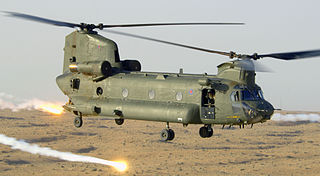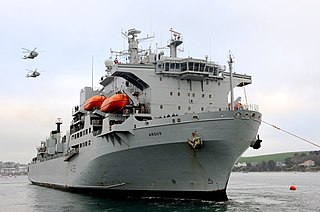Related Research Articles

The Special Boat Service (SBS) is the special forces unit of the United Kingdom's Royal Navy. The SBS can trace its origins back to the Second World War when the Army Special Boat Section was formed in 1940. After the Second World War, the Royal Navy formed special forces with several name changes—Special Boat Company was adopted in 1951 and re-designated as the Special Boat Squadron in 1974—until on 28 July 1987 when the unit was renamed as the Special Boat Service after assuming responsibility for maritime counter-terrorism. Most of the operations conducted by the SBS are highly classified, and are rarely commented on by the British government or the Ministry of Defence, owing to their sensitive nature.

The Boeing Chinook is a large, tandem rotor helicopter operated by the Royal Air Force (RAF). A series of variants based on the United States Army's Boeing CH-47 Chinook, the RAF Chinook fleet is the largest outside the United States. RAF Chinooks have seen extensive service in the Falklands War, the Balkans, Northern Ireland, Iraq, and Afghanistan.

Operation Barras was a British Army operation that took place in Sierra Leone on 10 September 2000, during the late stages of the nation's civil war. The operation aimed to release five British soldiers of the Royal Irish Regiment and their Sierra Leone Army (SLA) liaison officer, who were being held by a militia group known as the "West Side Boys". The soldiers were part of a patrol that was returning from a visit to Jordanian peacekeepers attached to the United Nations Mission in Sierra Leone (UNAMSIL) at Masiaka on 25 August 2000 when they turned off the main road and down a track towards the village of Magbeni. There the patrol of twelve men was overwhelmed by a large number of heavily armed rebels, taken prisoner, and transported to Gberi Bana on the opposite side of Rokel Creek.

16 Air Assault Brigade Combat Team, known simply as 16 Air Assault Brigade from 1999 – 2021, is a formation of the British Army predominantly based in Colchester, Essex. It makes up the Air Assault Task Force, a battlegroup held at high readiness, and is the only brigade in the British Army focused on operating via parachute, helicopter and air-landing.

No. 1310 Flight RAF is a flight of the Royal Air Force.

Emergency is a humanitarian NGO that provides free medical treatment to the victims of war, poverty, and landmines. It was founded in 1994. Gino Strada, one of the organization's co-founders, served as EMERGENCY's Executive Director. It operates on the premise that access to high-quality healthcare is a fundamental human right.

The II Squadron RAF Regiment is a squadron of the RAF Regiment based at RAF Brize Norton. The squadron is parachute trained.

Camp Shorabak is a former British Army airbase, located northwest of the city of Lashkargah in Helmand Province, Afghanistan. The camp was situated in a remote desert area, far from population centres.
No. 4626 Aeromedical Evacuation Squadron is a unit of the British Royal Auxiliary Air Force, which manages, maintains and trains its personnel for operational readiness in support of RAF requirements for Aeromedical Evacuation and Pre-Hospital Emergency Care, Primary Healthcare (PHC) and individual augmentees to other military healthcare capabilities, in times of conflict or crisis.

Bravo November is the original identification code painted on a British Royal Air Force Boeing Chinook HC6A military serial number ZA718. It was one of the original 30 aircraft ordered by the RAF in 1978 and has been in service ever since. It has been upgraded several times in its history, now being designated as an HC6A airframe. It has seen action in every major operation involving the RAF in the helicopter's 39-year service life. Since 1982 it has served in the Falkland Islands, Lebanon, Germany, Northern Ireland, Iraq and Afghanistan. The aircraft has seen four of its pilots awarded the Distinguished Flying Cross for actions whilst in command of Bravo November.
The United Kingdom began a military intervention in Sierra Leone on 7 May 2000 under the codename Operation Palliser. Although small numbers of British personnel had been deployed previously, Palliser was the first large-scale intervention by British forces in the Sierra Leone Civil War. In early May 2000, the Revolutionary United Front (RUF)—one of the main parties to the civil war—advanced on the country's capital, Freetown, prompting the British government to dispatch an "Operational Reconnaissance and Liaison Team" (ORLT) to prepare to evacuate foreign citizens. On 6 May, the RUF blocked the road connecting Freetown to the country's main airport, Lungi. The next day, British soldiers began to secure the airport and other areas essential to an evacuation. The majority of those who wished to leave were evacuated within the first two days of the operation, but many chose to stay following the arrival of British forces.
No. 903 Expeditionary Air Wing Royal Air Force is an Expeditionary Air Wing (EAW) of the Royal Air Force (RAF). It is currently based at RAF Akrotiri within the Sovereign Base Area on the Mediterranean island of Cyprus, and is tasked with conducting operations against Islamic State of Iraq and the Levant (ISIL) in Iraq and Syria.
The Battle of Al Waki Market took place in August 2007 in Al Waki Market in Basra, Iraq, between No. 1 Squadron RAF Regiment and approximately 50 members of the Iraqi insurgency. It is notable as the battle for which the first Military Cross was awarded to an airman of the Royal Air Force.

Organizations from around the world responded to the West African Ebola virus epidemic. In July 2014, the World Health Organization (WHO) convened an emergency meeting with health ministers from eleven countries and announced collaboration on a strategy to co-ordinate technical support to combat the epidemic. In August, they declared the outbreak an international public health emergency and published a roadmap to guide and coordinate the international response to the outbreak, aiming to stop ongoing Ebola transmission worldwide within 6–9 months. In September, the United Nations Security Council declared the Ebola virus outbreak in the West Africa subregion a "threat to international peace and security" and unanimously adopted a resolution urging UN member states to provide more resources to fight the outbreak; the WHO stated that the cost for combating the epidemic will be a minimum of $1 billion.

Operation Gritrock was the code name given to the British, Irish and Canadian participation in the fight against the Ebola virus epidemic in West Africa. In November 2015, Sierra Leone was officially declared Ebola free. More than 50 members of British Army's 5 Armoured Medical Regiment were presented with operational medals for their duties in Sierra Leone during the crisis. Members of the Irish Army Medical Corps were awarded the International Operational Service Medal by the Irish government.

Ebola virus disease in the United Kingdom and Ireland has occurred rarely in four cases to date, namely three health workers returning from treating victims of the Ebola virus epidemic in West Africa in 2014 and 2015, and a single case in 1976, when a laboratory technician contracted the disease in a needlestick injury while handling samples from Africa. All cases recovered. As of 2023, no domestic transmission of Ebola has occurred in the United Kingdom or Ireland.

Air Vice-Marshal Philip Jeremy Robinson, is a decorated British pilot and senior Royal Air Force officer.
The Princess Mary's Hospital, RAF Akrotiri,, was a military hospital located on the Royal Air Force base at Akrotiri on the island of Cyprus. The hospital was the last British military hospital to remain in operation after all other hospitals had closed down in the 1990s and 2000s. Originally the site was a dedicated RAF Hospital, but since 1996 it had been a Defence Medical Services asset. The hospital provided care for service personnel, their dependants and the local Cypriot population. It also treated many others from non-British and non-Cypriot countries. The setting of the hospital gave rise to the nickname Alcatraz, and it was staffed by personnel from the Royal Air Force and the British Army.

Lieutenant General Andrew Sean David Harrison, is a retired senior officer in the British Army who served as the Deputy Commander of United Nations Command in South Korea from 2021 to 2023.
References
- 1 2 3 "Military Art Prints and Original Paintings by Stuart Brown". www.cranstonfinearts.co.uk. Retrieved 29 October 2022.
- 1 2 "About The Artist". Spartan Military Prints. Archived from the original on 29 October 2022. Retrieved 29 October 2022.
- 1 2 Greaves, Ian (2018). Military Medicine in Iraq and Afghanistan: A Comprehensive Review. CRC Press. p. 107. ISBN 978-1-351-37215-2.
- ↑ "The RAF Regiment Association Rockape Shop". RAF Regiment Association Official Website - Home for all Rockapes. Retrieved 2 November 2022.
- ↑ Vassallo, David (1 June 2015). "A short history of Camp Bastion Hospital: part 2—Bastion's catalytic role in advancing combat casualty care" . BMJ Military Health. 161 (2): 160–166. doi:10.1136/jramc-2015-000437. ISSN 2633-3767. PMID 25896811. S2CID 207009375.
- ↑ "Military Medical Revolution". www.friendsofmillbank.org. Archived from the original on 29 October 2022. Retrieved 29 October 2022.
- ↑ Buckenmaier (III), Chester; Mahoney, Peter F.; Institute (U.S.), Borden (2015). Combat Anesthesia: The First 24 Hours. Government Printing Office. p. vi. ISBN 978-0-16-092753-9.
- ↑ "'What matters most'". Military Artist Stuart Brown. Archived from the original on 30 October 2022. Retrieved 30 October 2022.
- 1 2 "Operation Gritrock Ebola Outbreak Sierra Leone". www.qaranc.co.uk. Archived from the original on 29 October 2022. Retrieved 29 October 2022.
- 1 2 Vassallo, David. "British Modern Military History Society • Book Review: Glimpses of the Falklands War". British Modern Military History Society. Retrieved 2 November 2022.
- ↑ "The Countess of Wessex visits the Royal Military Academy". The Royal Family. 18 November 2016. Archived from the original on 31 October 2022. Retrieved 31 October 2022.
- ↑ "Unveiling of 'Action at Laterza Bridge' by Stuart Brown, 2014. | ParaData". www.paradata.org.uk. Retrieved 3 November 2022.
- ↑ Strickland, Tim (2021). "13. Longstop to victory". Strick: Tank Hero of Arras: The Making of an Extraordinary Soldier. Oxford: Casemate Publishers. p. 142. ISBN 978-1-61200-985-8.
- ↑ "7. 1995-2020 Information warfare: cyber and IT". Roger So Far ...: The first 100 years of the Royal Corps of Signals. Gloucestershire: The History Press. 2020. pp. 227–228. ISBN 978-0-7509-9541-2.
- ↑ Camp, Dick (2012). "3. State within a state". Boots on the Ground: The Fight to Liberate Afghanistan from Al-Qaeda and the Taliban, 2001-2002. Motorbooks International. p. 44. ISBN 978-0-7603-4111-7.